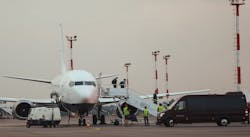Passenger handling is but one of the many activities performed by aircraft ground handling service providers. As per the definitions contained in the European Union (EU) Ground Handling Directive, passenger handling comprises “any kind of assistance to arriving, departing, transfer or transit passengers, including checking tickets and travel documents.”
In the context of the current COVID-19 global pandemic, borders in Europe may be open at the moment, but there are still several restrictions – although exemptions may apply for passengers working in the medical sector, transport workers, etc. Moreover, arriving passengers may have to quarantine.
“The ground handling service providers play a role in all these verifications. It is thus a change in the passenger handling activity, especially with the special care requirements for health safety,” affirms Catherine Erkelens of law firm Erkelens Law.
Travel Restrictions
The new health safety responsibilities of ground handling service providers are being accompanied by a reduction in business, which has been very clear from their perspective.
“Most of Baltic Ground Services’ (BGS) main clients at Eastern Europe’s operating bases are still operating at a reduced capacity, which translates into less than one-third of our capacity used across our operating locations,” says Gytis Gumuliauskas, CEO of BGS Group. “Our main hub at Vilnius Airport is currently leading the operations with more than one-third of the available capacity used; this is a slow, but steady recovery from the lows of March and April 2020.
“Although this is currently unknown, we believe that capacity usage may come down in the coming weeks due to stricter traveling, growing number of COVID-19 cases and quarantine requirements. All of this, as a result, has led tour operators to cancel all leisure destinations for the autumn period.”
Schedule Changes
Travel restrictions are having a significant impact on air travel and all related stakeholders.
“Fragmented and unilateral application of entry requirement, border closures and quarantine measures means that, of course, airlines must change their schedules at short notice to adapt to the demand. Naturally, the number of ground handling staff across the industry has reflected this, seeing a reduction in the amount of staff themselves and in the number of working hours,” says Montserrat Barriga, director general of the European Regions Airline Association (ERA).
Since most of the flights currently operated are intra-European, airlines adjust their schedules according to changing quarantine and traveling restrictions imposed by each country.
“Because the information is always public and accessible in advance, BGS is able to pre-plan decreases/increases in demand and meet the current market needs at every airport it is operating,” says Gumuliauskas.
The European Organization for the Safety of Air Navigation, commonly known as EUROCONTROL, indeed provides information on a daily basis.
“The air carriers are the ground handlers’ customers, there is a contractual relationship among them,” states Erkelens. “There is an IATA standard for a ground handling agreement, but the contracting parties are free to make their contractual arrangements. Thus, the changes in the service and the cost thereof for the airlines may vary according to the contractual arrangements between the airlines and the ground handlers.”
Aviation Health Safety
Following the COVID-19 Aviation Health Safety Protocol, published for the first time May 21, 2020 by the European Union Aviation Safety Agency (EASA) and the European Centre for Disease Prevention and Control (ECDC), ground handling service providers have been taking a series of measures in relation to their activities at EU airports.
“The protocol contains operational guidelines for the management of air passengers and aviation personnel in relation to the COVID-19 pandemic. In line with the evolution of the pandemic, these guidelines are being regularly updated, and consequently the measures evolve. The impacted ground handling activity is mainly passenger handling and aircraft services, which includes the cleaning of the aircraft,” says Erkelens.
The protocol aims at avoiding symptomatic passengers and crew members being present for departure. It underlines the need for the implementation of physical distancing, enhanced hygiene measures for staff and passengers and enhanced facility cleaning.
“Contact and touching of surfaces should be minimized by the use of electronic alternatives,” says Erkelens, noting mobile check-in and non-contact boarding as examples. “Health safety promotion materials must be made available. Face masks are recommended for all persons within the airport and aircraft. Procedures for safe disposal of the masks need to be in place.
“The ground handlers must provide personal protective equipment (PPE) to their staff members and ensure that they are trained in the appropriate use of this PPE,” she continues. “Staff members who interact with passengers directly, or not from behind a screen, should wear a medical face mask, gloves and uniforms to be changed daily, and, where uniforms cannot be changed daily, a protection suit should be used.”
It’s requested ground handlers enhance cleaning activities “both in amplitude and frequency,” following the ECDC guidance requiring the use of standard detergents, hand-disinfectant at security locations and avoiding air blowing procedures.
“Aircraft should be cleaned and disinfected in accordance with the EASA aircraft cleaning and disinfection guidance. Finally, the passenger handling service may include taking the statement from passengers on their COVID-19 status before handing over the boarding pass,” says Erkelens.
Barriga observes that there is indeed a high number of publications, regulations and standards from the EU, EASA, ECDC, International Civil Aviation Organization (ICAO) and World Health Organization (WHO), but she believes that one of the biggest problems seems to be the national regulations set in addition to what is recommended by these authorities.
“This leads to some uncertainty as how to act in the right way. This is also compounded by the fact that by its very nature, organizations are encountering totally new problems and issues that no one has experienced before. Consequently, it is a constant learning period as to how to act. Of course, for all involved the number one priority remains safety and following the latest advice provided,” she says.
BGS has adhered to the recommendations or requirements published by the governing body in every country where it is operating.
“Whether it is social distancing or mandatory use of masks, we are supporting recommendations and communicating with our operatives to ensure smooth and safe operations,” adds Gumuliauskas.
Prevention of Staff Layoff
Erkelens highlights that the EU has taken measures to avoid, to the extent possible, laying off workers in the ground handling sector.
“In some Eastern European airports, the number of suppliers of ground handling services is limited by law – as allowed by the EU Ground Handling Directive and conforming to the local implementation. In that case, suppliers are selected for a maximum period of seven years,” she says.
Following the COVID-19 pandemic, as handlers may have difficulties obtaining financing, the EU – with a Regulation of May 25, 2020 (2020/696) – has extended that maximum period. Contracts of, or authorizations granted to, selected suppliers that expire in the period from May 28, 2020 until Dec. 31, 2021 may be prolonged, until Dec. 31, 2022.
“The new regulation points out that this extension of authorizations should aim to preserve jobs and workers’ rights. It refers to the need for financial reconstruction with a plan which aims to prevent layoffs and with guarantees that financial reconstruction will not be detrimental to the workers. Furthermore, in airports where the number of suppliers is limited, suppliers might cease to provide their services at a given airport before a new supplier can be selected with the normal tender procedure,” says Erkelens, citing a case of bankruptcy as an example.
Regulation 2020/696 allows the airport managing body to then choose a ground handling service provider directly to provide the services without holding the normally required tender procedure, for a maximum period of six months or for a period until Dec. 31, 2020, whichever is the longer.
“The commission may further extend these periods where it finds ‘that the reduction in the level of air traffic, as compared to the level in the corresponding period in 2019, is persisting and is likely to persist, that this situation is the result of the impact of the COVID-19 pandemic, and that it results in interruption of supply of ground handling services or difficulties in access to financing for suppliers,’” says Erkelens.
Coping with Reduced Resources
Ground handling service providers have needed to cope with reduced resources because of the reduced business.
“Due to significant impact to BGS operations, we had to downsize our workforce and currently the company is operating at a minimal optimal capacity. We do expect a recovery to some degree in the future, thus we are employing more employees than needed, as there is no possibility of sourcing experienced and trained professionals quickly,” says Gumuliauskas.
Erkelens observes that while it is difficult for a number of ground handlers, on the other hand the staff of the ground handlers is often working with flexible hours and part-time.
“It often concerns younger people usually showing some readiness to adapt to new situations. Unions are usually strong and of course follow up closely on the situation,” she says.
The way handlers are coping with reduced resources largely depends on the structure of the ground handling company and the working models.
“There are also national regulations which support reduced businesses in view of taking over the payment or support with special payments,” concludes Barriga.
About the Author

Mario Pierobon
Dr. Mario Pierobon provides solutions in the areas of documentation, training and consulting to organizations operating in safety-sensitive industries. He has conducted a doctoral research project investigating aircraft ground handling safety. He may be reached at [email protected].
